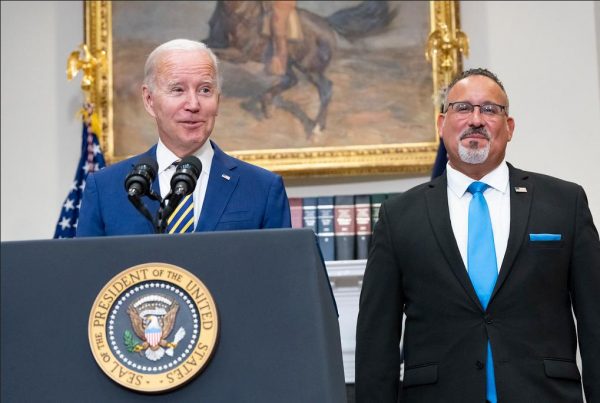U.S. Federal Courts
Title IX protections blocked in six more states
Ruling applies to Va.

BY McKENNA HORSLEY | A federal judge has blocked new Title IX rules, including those aimed at protecting LGBTQ students from discrimination in K-12 schools, and sided with Republican attorneys general in several states — including Kentucky.
Chief Judge Danny Reeves of the U.S. District Court in Eastern Kentucky on Monday issued a ruling siding with Republican Attorney General Russell Coleman and his counterparts in five other states. The ruling prevents the U.S. Department of Education from “implementing, enacting, enforcing, or taking any action to enforce the Final Rule, Nondiscrimination on the Basis of Sex in Education Programs or Activities Receiving Federal Financial Assistance,” which was set to begin Aug. 1.

Coleman and the GOP attorneys general filed the lawsuit in April. At the time, they argued the Department of Education “used rulemaking power to convert a law designed to equalize opportunities for both sexes into a far broader regime of its own making” with the new Title IX regulations.
Reeves limited the injunction to the plaintiff states of Tennessee, Kentucky, Ohio, Indiana, Virginia and West Virginia.
The Biden administration introduced the rules to “build on the legacy of Title IX by clarifying that all our nation’s students can access schools that are safe, welcoming, and respect their rights,” U.S. Secretary of Education Miguel Cardona said in a statement. The rules also would have rolled back Trump administration changes that narrowly defined sexual harassment and directed schools to conduct live hearings, allowing those who were accused of sexual harassment or assault to cross-examine their accusers.

In their complaint, the state attorneys general said that under the Biden rule, “Men who identify as women will, among other things, have the right to compete within programs and activities that Congress made available to women so they can fairly and fully pursue academic and athletic excellence — turning Title IX’s protections on their head … And anyone who expresses disagreement with this new status quo risks Title IX discipline for prohibited harassment.”
Established in 1972, Title IX was created to prevent “discrimination based on sex in education programs or activities that receive federal financial assistance,” according to the Department of Education.
Reeves wrote in his opinion that “the Department of Education seeks to derail deeply rooted law” created by the implementation of Title IX.
“At bottom, the department would turn Title IX on its head by redefining ‘sex’ to include ‘gender identity.’ But ‘sex’ and ‘gender identity’ do not mean the same thing,” he wrote. “The department’s interpretation conflicts with the plain language of Title IX and therefore exceeds its authority to promulgate regulations under that statute.”
In a press release, Coleman’s office said Monday that schools that would fail to comply with the new rules would risk losing federal funding. Citing the Department of Education, the office said Kentucky’s public and private schools received a total of $1.1 billion in federal funding last year.
“As a parent and as attorney general, I joined this effort to protect our women and girls from harm. Today’s ruling recognized the 50-plus years of educational opportunities Title IX has created for students and athletes,” Coleman said in the press release. “We’re grateful for the court’s ruling, and we will continue to fight the Biden administration’s attempts to rip away protections to advance its political agenda.”
A spokesperson for the department said it was reviewing the ruling.
“Title IX guarantees that no person experience sex discrimination in a federally-funded educational environment,” the spokesperson added. “The department crafted the final Title IX regulations following a rigorous process to realize the Title IX statutory guarantee. The department stands by the final Title IX regulations released in April 2024, and we will continue to fight for every student.”
******************************************************************************************

McKenna Horsley covers state politics for the Kentucky Lantern. She previously worked for newspapers in Huntington, W.Va., and Frankfort, Ky. She is from northeastern Kentucky.
******************************************************************************************
The preceding story was previously published by the Kentucky Lantern and is republished with permission.
The Kentucky Lantern is an independent, nonpartisan, free news service based in Frankfort a short walk from the Capitol, but all of Kentucky is our beat.
We focus on how decisions made in the marble halls of power ripple through the lives of Kentuckians. We bring attention to injustices and hold institutions and officials accountable. We tell the stories of Kentuckians who are making a difference and shine a light on what’s working. Our journalism is aimed at building a fairer, healthier Kentucky for all.
Kentucky Lantern is part of States Newsroom, the nation’s largest state-focused nonprofit news organization.
Maryland
4th Circuit dismisses lawsuit against Montgomery County schools’ pronoun policy
Substitute teacher Kimberly Polk challenged regulation in 2024

A federal appeals court has ruled Montgomery County Public Schools did not violate a substitute teacher’s constitutional rights when it required her to use students’ preferred pronouns in the classroom.
The 4th U.S. Circuit Court of Appeals in a 2-1 decision it released on Jan. 28 ruled against Kimberly Polk.
The policy states that “all students have the right to be referred to by their identified name and/or pronoun.”
“School staff members should address students by the name and pronoun corresponding to the gender identity that is consistently asserted at school,” it reads. “Students are not required to change their permanent student records as described in the next section (e.g., obtain a court-ordered name and/or new birth certificate) as a prerequisite to being addressed by the name and pronoun that corresponds to their identified name. To the extent possible, and consistent with these guidelines, school personnel will make efforts to maintain the confidentiality of the student’s transgender status.”
The Washington Post reported Polk, who became a substitute teacher in Montgomery County in 2021, in November 2022 requested a “religious accommodation, claiming that the policy went against her ‘sincerely held religious beliefs,’ which are ‘based on her understanding of her Christian religion and the Holy Bible.’”
U.S. District Judge Deborah Boardman in January 2025 dismissed Polk’s lawsuit that she filed in federal court in Beltsville. Polk appealed the decision to the 4th Circuit.
U.S. Federal Courts
Federal judge in Md. rules against White House passport policy
Lambda Legal represents transgender, nonbinary people in lawsuit

A federal judge in Maryland on Tuesday ruled in favor of six transgender people who are challenging the Trump-Vance administration’s passport policy.
President Donald Trump once he took office signed an executive order that banned the State Department from issuing passports with “X” gender markers. A memo the Washington Blade obtained directed State Department personnel to “suspend any application where the applicant is seeking to change their sex marker from that defined in the executive order
pending further guidance.”
The Trump-Vance administration only recognizes two genders: male and female.
The lawsuit that Lambda Legal filed in U.S. District Court for the District of Maryland in Baltimore in April alleges the policy “has caused and is causing grave and immediate harm to transgender people like plaintiffs, in violation of their constitutional rights to equal protection.”
Seven trans people — Zander Schlacter, Jill Tran, Lia Hepler-Mackey, David Doe, Robert Roe, Peter Poe, and Kris Koe — filed the lawsuit.
Roe is a U.S. Foreign Service Officer who currently lives in Europe. Lambda Legal, who represents him and the six other plaintiffs, notes Chief Judge George L. Russell III dismissed Roe’s case because the State Department has yet to deny him “an accurate passport.”
“Like every other court that has considered this executive order, the court finds its stated purpose does not serve an important governmental interest that is exceedingly persuasive; further, the discriminatory means employed are not substantially related to the achievement of those objectives,” said Russell in his ruling.
Lambda Legal Counsel Carl Charles described Russell’s decision as “a crucial victory for our clients and transgender people nationwide who have been trapped by this administration’s cruel and discriminatory policy.”
“The court recognized that forcing inaccurate identity documents on transgender Americans causes immediate and irreparable harm,” said Charles in a press release. “Our clients can now travel with dignity and safety while we continue fighting to overturn this discriminatory policy entirely.”
The American Civil Liberties Union earlier this year filed a separate lawsuit against the passport directive on behalf of seven trans and nonbinary people.
A federal judge in Boston in April issued a preliminary junction against it. A three-judge panel on the 1st U.S. Circuit Court of Appeals last week ruled against the Trump-Vance administration’s motion to delay the move.
U.S. Federal Courts
AGs sue White House over push to restrict gender-affirming care in blue states
14 states, DC joined the lawsuit filed Friday

A group of 15 Democratic attorneys general and Pennsylvania Gov. Josh Shapiro (D) have accused the Trump-Vance administration of unlawfully pressuring health providers to withhold access to gender-affirming medicine for minors in places where these treatments remain legal.
In a complaint filed in the U.S. District Court for the District of Massachusetts on Friday, the attorneys general outlined multiple ways in which, they claim, the administration has overstepped its authority to restrict care that is protected under state law, such as by threatening providers with meritless lawsuits and federal investigations.
On the first day of his second term, President Donald Trump directed the Justice Department to pursue enforcement actions to proscribe medically necessary gender related interventions, which were characterized in his executive order as “chemical and surgical mutilation.”
Thereafter, the DOJ has issued subpoenas, demanded private patient data, and suggested that criminal charges might be coming — actions that have no legal basis, and instead constitute efforts to strong-arm Democratic states into alignment with the administration’s position on gender-affirming care for minors, according to the complaint.
As a result of these pressures, the attorneys general argue, providers have reduced or eliminated services while patients have reported cancelled appointments and uncertainty over whether they can continue receiving treatment.
Their lawsuit asks the court to block the administration’s actions and halt the enforcement of the executive order along with another that prohibits the federal government from recognizing transgender people or acknowledging that gender identity does not always correspond with one’s sex at birth.
The 15 attorneys general are from Massachusetts, California, New York, Connecticut, Illinois, Delaware, D.C., Hawaii, Maine, Maryland, Michigan, Nevada, New Jersey, New Mexico, Rhode Island, and Wisconsin.



















